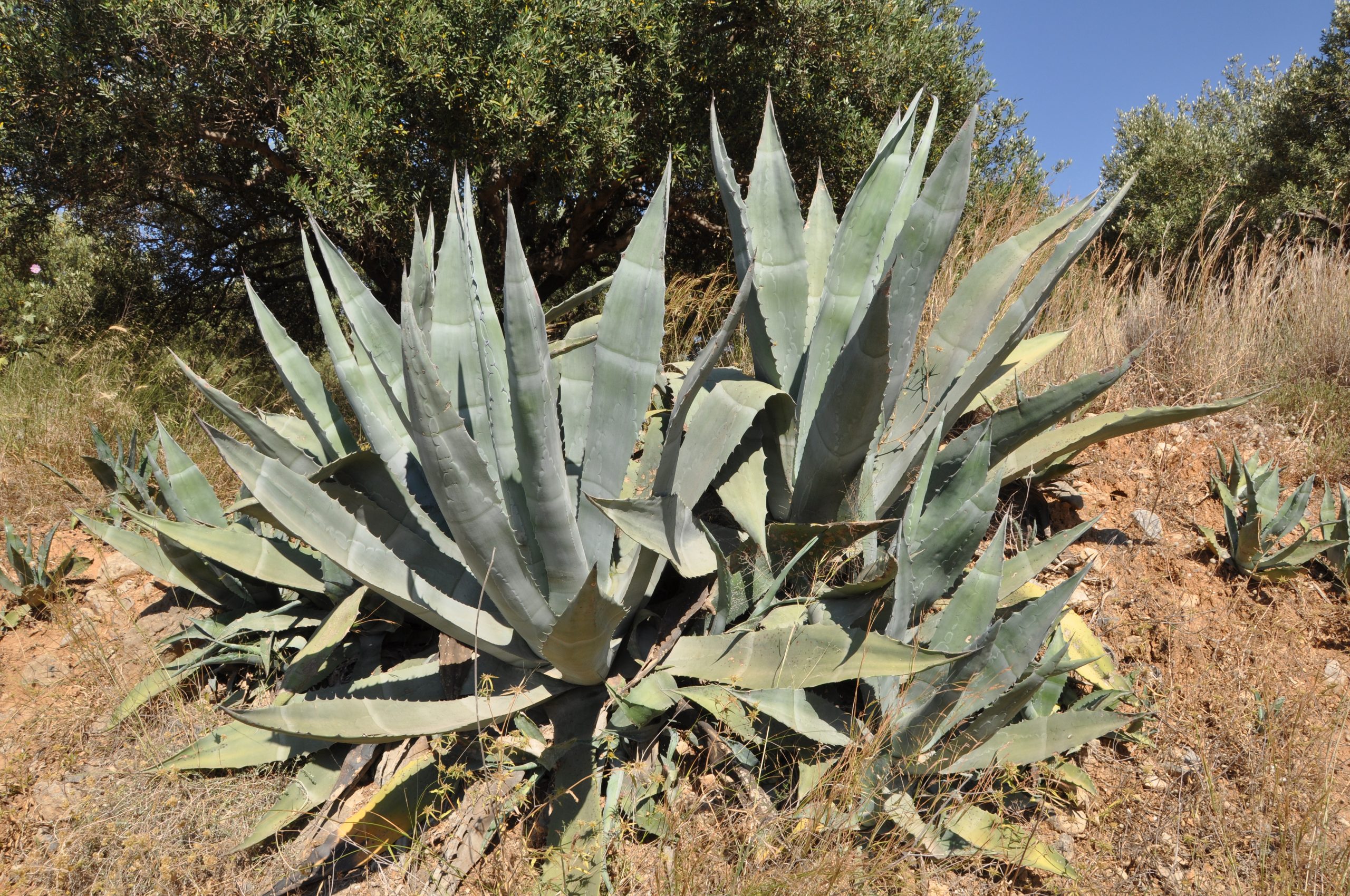Common Names and Other Names:
- Agave
- Century Plant
- American Aloe
- Maguey
- Sentry Plant
- Spiked Aloe
Where Does It Occur:
Agave americana is native to Mexico but has been naturalized in various regions around the world, including:
- Southern United States
- Central and South America
- Mediterranean Basin
- Africa
- India
- Australia
The plant thrives in arid and semi-arid climates, preferring well-drained soils and full sun exposure. It is commonly found in:
- Deserts
- Rocky Hillsides
- Coastal Areas
- Dry Slopes
Basic Ingredients (Constituents):
Agave americana contains several bioactive compounds:
- Saponins:
- Hecogenin
- Tigogenin
- Polysaccharides:
- Inulin (a type of fructan)
- Steroidal Glycosides:
- Agavoside A and B
- Fructans:
- Fructo-oligosaccharides (FOS)
- Enzymes:
- Proteases
- Vitamins and Minerals:
- Vitamin C
- Vitamin B Complex
- Calcium
- Iron
- Magnesium
These constituents contribute to agave’s potential medicinal properties, including anti-inflammatory, antimicrobial, antioxidant, and digestive effects.
Most Commonly Used For Treatment Of:
- Digestive Health:
- Laxative Effect: Used to relieve constipation due to its high inulin content.
- Prebiotic Properties: Supports the growth of beneficial gut bacteria.
- Skin Conditions:
- Wound Healing: Applied topically to promote healing of minor cuts, burns, and insect bites.
- Anti-inflammatory: Reduces inflammation in skin conditions like dermatitis.
- Antimicrobial Effects:
- Inhibits the growth of certain bacteria and fungi.
- Anti-inflammatory Properties:
- May reduce internal inflammation when consumed.
- Diabetes Management:
- Blood Sugar Regulation: Inulin may help moderate blood glucose levels.
- Immune System Support:
- Provides general immune-enhancing effects due to its nutrient content.
Side Effects:
While agave is generally considered safe when used appropriately, potential side effects may include:
- Skin Irritation:
- Contact Dermatitis: The sap can cause irritation, redness, itching, and rash upon contact with the skin.
- Gastrointestinal Issues:
- Upset Stomach: Nausea, diarrhea, or abdominal cramps when consumed in large amounts.
- Allergic Reactions:
- Rare, but may include swelling, difficulty breathing, or hives in sensitive individuals.
- Interaction with Medications:
- May interact with blood sugar-lowering medications due to its effect on glucose levels.
- Toxicity:
- Saponins: High doses may be toxic, leading to vomiting or diarrhea.
Available Forms in the Market:
- Agave Nectar (Syrup):
- A natural sweetener used as a sugar substitute.
- Dried Leaves and Fibers:
- Used in herbal preparations and teas.
- Powdered Supplements:
- Containing inulin or other extracts for digestive health.
- Topical Gels and Creams:
- For skin applications, similar to aloe vera gels.
- Raw Plant Material:
- Leaves and sap used in traditional remedies.
- Agave Spirits:
- Tequila and mezcal are distilled beverages made from fermented agave (note: alcoholic beverages, not medicinal products).
Research and Results:
- Prebiotic Effects:
- Study: “Inulin-type fructans from agave improve gastrointestinal health.”
- Findings: Agave-derived inulin promotes the growth of beneficial gut bacteria like Bifidobacteria and Lactobacilli.
- Link: Journal of Food Science
- Antimicrobial Activity:
- Study: “Antimicrobial properties of Agave americana.”
- Findings: Extracts showed inhibitory effects against bacteria such as E. coli and Staphylococcus aureus.
- Link: Journal of Ethnopharmacology
- Anti-inflammatory Properties:
- Study: “Anti-inflammatory activity of Agave americana leaf extract.”
- Findings: Demonstrated reduction in inflammation markers in animal models.
- Link: Phytotherapy Research
- Blood Sugar Regulation:
- Study: “Agave fructans and glycemic control.”
- Findings: Consumption of agave fructans may help reduce blood glucose levels in mice.
- Link: Journal of Medicinal Food
Note: Many studies are preliminary and conducted on animals or in vitro. More clinical trials on humans are needed to confirm efficacy.
Precautions:
- Pregnancy and Breastfeeding:
- Avoid Use: Agave may stimulate uterine contractions; not recommended during pregnancy or breastfeeding.
- Children:
- Use with Caution: Safety has not been established; consult a pediatrician before use.
- Allergies:
- Individuals allergic to plants in the Agavaceae family should avoid use.
- Diabetes:
- Monitor Blood Sugar: Agave nectar has a high fructose content; may affect blood sugar levels. Diabetics should use with caution.
- Medication Interactions:
- Blood Sugar Medications: May enhance hypoglycemic effects.
- Diuretics: May interact due to its mild diuretic properties.
- Skin Contact:
- Protective Measures: Wear gloves when handling the plant to avoid skin irritation.
- Avoid High Doses:
- Excessive consumption may lead to toxicity due to saponin content.
Conclusion:
Agave (Agave americana) is a succulent plant known for its various traditional medicinal uses and as a source of natural sweetener (agave nectar). It possesses potential health benefits, including digestive support, antimicrobial effects, and anti-inflammatory properties. However, caution is advised due to possible side effects and limited clinical evidence supporting many of its purported benefits.
Recommendations:
- Consult a Healthcare Professional: Before using agave for medicinal purposes, especially if you have underlying health conditions or are taking medications.
- Moderation is Key: Use agave products as directed and avoid excessive consumption.
- Quality Assurance: Purchase products from reputable sources to ensure purity and safety.
Disclaimer: This information is intended for educational purposes and should not replace professional medical advice. Please consult a qualified healthcare provider for personalized guidance before using agave for medicinal purposes.
« Back to Glossary Index